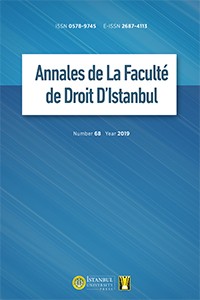Abstract
Liberty is defined in dictionaries as not being determined by anything outside of oneself. Despite the clarity of this definition, liberty has been one of the most debated concepts throughout history and still is today. Isaiah Berlin, one of the most significant political philosophers of the twentieth century, is an important architect of the negative-positive liberty dichotomy. Berlin created the opportunity of an assessment from a different perspective of moral and political contexts by considering the dual nature of liberty and using value plurality concept. By dividing liberty into negative and positive liberties, Berlin, with the classical liberal tendency, points to negative liberty, considered with the value pluralism, as the one that should be emphasized. Negative liberty is the “private” sphere which determines the borders and the purpose of liberties and in which people can take decisions without an external impact. Berlin specifically emphasizes that “negative” here does not indicate an unfavorableness but points to the sphere that “does not accept any impact”. He calls liberty which takes place in the public sphere as positive liberty. Positive liberty takes place in the outer atmosphere. It is very much related to democracy as the way of governance and also to liberal rights. The division of positive and negative liberties, as Berlin called his significant article in 1958, is still in use to define liberty. This division is also effective in the context of “substance” and “conceptual field” separation.
Supporting Institution
The author received no grant support for this work.
References
- Berlin, I.: Two Concepts of Liberty, Four Essays on Liberty, (Oxford University Press, 1969).
- Berlin, I.: The Hedgehog and the Fox: An Essay on Tolstoy’s View of History, (Princeton University Press, 2013).
- Gürler, S.: Ahlak ve Adalet, (Legal Yayıncılık, 2007). Işıktaç, Y.: Hukuk Felsefesi, (Filiz Kitabevi, 2019).
- Nancy, J. L.: ‘Freedom and We’, in Dennis King Keenan (ed), Hegel and Contemporary Continental Philosophy, (State University of New York Press, 2004).
- Oakeshott, M.: Morality and Politics in Modern Europe: The Harvard Lectures, (Yale University Press, 1993).
- Rorty, R.: Philosophy and the Mirror of Nature, (Blackwell Publishing, 1996).
- Taylor, C.: ‘What’s Wrong with Negative Liberty’, in Alan Ryan (ed), The Idea of Freedom: Essays in Honor of Isaiah Berlin (Oxford University Press, 1979).
- Taylor, C.: Philosophical Arguments, (Harvard University Press, 1995).
- Uygur, G.: Hukukta Adaletsizliği Görmek, (Türkiye Felsefe Kurumu, 2013).
Abstract
Özgürlük, sözlüklerde, bir şeyin kendisi dışında bir şey veya etkiyle belirlenmemiş olması şeklinde tanımlanır. Bu tanımın netliğine rağmen özgürlük, tarih boyunca ve günümüzde de, üzerinde en çok tartışma yürütülen kavramlardan biri olmaya devam etmektedir. Yirminci yüzyılın önemli siyaset felsefecilerinden Isaiah Berlin, özgürlüğün, başlıkta geçtiği üzere negatif ve pozitif olarak ayrıştırılmasının önemli bir mimarıdır. Berlin özgürlük kavramının ikili doğasını göz önünde bulundurarak ve değer çoğulculuğu kavramını da kullanarak ahlak ve siyaset bağlamının farklı bir perspektiften değerlendirilmesi olanağını yaratmıştır. Özgürlüğün pozitif ve negatif özgürlük olarak ayrılması yolu ile Berlin’in klasik liberal eğilimler ekseninde, değer çoğulculuğu ile birlikte asıl üzerinde durulması gereken özgürlük türü olarak negatif özgürlüğe işaret ettiğini görmekteyiz. Negatif özgürlük; bireysel özgürlüklerin amacını ve sınırlarını belirleyen, kişinin etki altında kalmaksızın kararlar alabildiği “özel” alandır. Berlin “negatif” isimlendirmesinin bir olumsuzluk anlatımı olmaya değil, “etki kabul edilemez alana” işaret ettiğini özel olarak belirtmektedir. Kamusal alanda gerçekleşen özgürlüğü ise pozitif özgürlük olarak isimlendirmektedir. Pozitif özgürlük dış atmosferde gerçekleşir. Yönetim bicimi olarak demokrasi ve liberal haklarla çok yakından ilgilidir. Berlin’in 1958 yılında yazmış olduğu önemli bir makalesinin de ismi olan negatif – pozitif özgürlük ayrımı, özgürlüğün nitelendirilmesinde günümüzde de etkin olarak kullanılmaktadır; bu ayrım, aynı zamanda, “öz” ve “kavramsal alan” ayrımı acısından da etkindir.
References
- Berlin, I.: Two Concepts of Liberty, Four Essays on Liberty, (Oxford University Press, 1969).
- Berlin, I.: The Hedgehog and the Fox: An Essay on Tolstoy’s View of History, (Princeton University Press, 2013).
- Gürler, S.: Ahlak ve Adalet, (Legal Yayıncılık, 2007). Işıktaç, Y.: Hukuk Felsefesi, (Filiz Kitabevi, 2019).
- Nancy, J. L.: ‘Freedom and We’, in Dennis King Keenan (ed), Hegel and Contemporary Continental Philosophy, (State University of New York Press, 2004).
- Oakeshott, M.: Morality and Politics in Modern Europe: The Harvard Lectures, (Yale University Press, 1993).
- Rorty, R.: Philosophy and the Mirror of Nature, (Blackwell Publishing, 1996).
- Taylor, C.: ‘What’s Wrong with Negative Liberty’, in Alan Ryan (ed), The Idea of Freedom: Essays in Honor of Isaiah Berlin (Oxford University Press, 1979).
- Taylor, C.: Philosophical Arguments, (Harvard University Press, 1995).
- Uygur, G.: Hukukta Adaletsizliği Görmek, (Türkiye Felsefe Kurumu, 2013).
Details
| Primary Language | English |
|---|---|
| Subjects | Law in Context |
| Journal Section | Makaleler |
| Authors | |
| Publication Date | January 17, 2020 |
| Submission Date | October 22, 2019 |
| Published in Issue | Year 2019 Issue: 68 |


